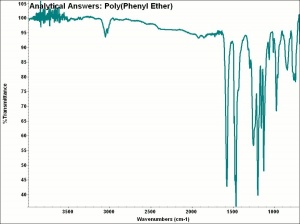Difference between revisions of "Polyphenylene oxide"
Jump to navigation
Jump to search
(Undo revision 31232 by Contributions/ ([[User talk:|talk]])) |
m (Text replace - "== Authority ==" to "== Sources Checked for Data in Record ==") |
||
| Line 13: | Line 13: | ||
Resistant to acids, alkalis and oils.Attacked by many organic solvents. | Resistant to acids, alkalis and oils.Attacked by many organic solvents. | ||
| − | == | + | == Sources Checked for Data in Record == |
* Theodore J. Reinhart, Theodore J. Reinhart, 'Glossary of Terms', ''Engineered Plastics'', ASM International, 1988 | * Theodore J. Reinhart, Theodore J. Reinhart, 'Glossary of Terms', ''Engineered Plastics'', ASM International, 1988 | ||
Revision as of 14:02, 1 May 2016
Description
A thermoplastic polymer made by the oxidative condensation of 2,6-dimethyl phenol. Polyphenylene oxide, PPO, is a good electrical insulator. It is a noncrystalline polymer that can crack when exposed to UV light or halogenated solvents. Modified PPO is made by blending PPO with 50% by weight polystyrene. Modified PPO is used as a structural foam in appliances and electrical housings.
Synonyms and Related Terms
PPHOX; PPO; polyphenylene ether; poli(xido de fenileno) (Esp.); xido de polifenileno (Port.)
Other Properties
Resistant to acids, alkalis and oils.Attacked by many organic solvents.
Sources Checked for Data in Record
- Theodore J. Reinhart, Theodore J. Reinhart, 'Glossary of Terms', Engineered Plastics, ASM International, 1988
- Website address 1, Website address 1 Comment: www.me.umist.ac.uk.historyp
